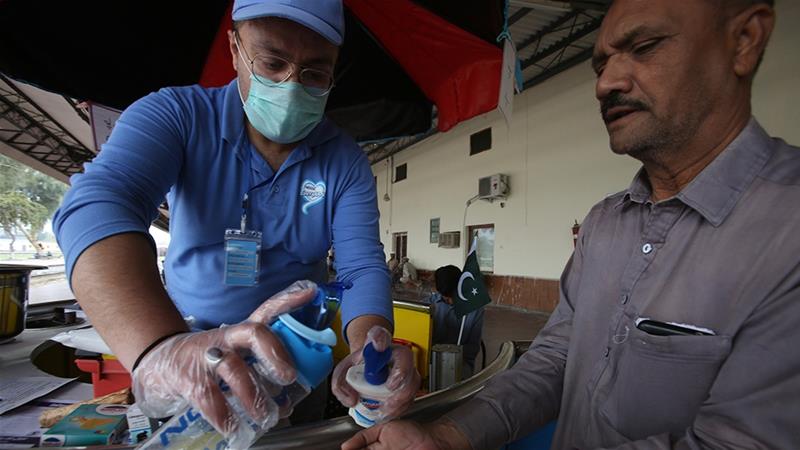Home » Middle East »
Pakistan PM: 'Cannot afford' to shut down cities over coronavirus
Imran Khan has called upon his countrymen ‘not to panic’ amid a spike in coronavirus cases in the country.
Islamabad, Pakistan – Pakistani Prime Minister Imran Khan has called upon his countrymen “not to panic” amid a spike in coronavirus cases in the country, warning that the spread of COVID-19 was inevitable and that Pakistan cannot currently afford the economic cost of shutting down its cities.
As of Wednesday, Pakistan has recorded at least 243 cases of the highly contagious coronavirus, most linked to travellers who have returned home from neighbouring Iran, according to government data. It is the highest number of confirmed cases in South Asia, compared with 147 in India, 44 in Sri Lanka, and 22 in Afghanistan.
More:
-
Pakistan’s spike in coronavirus cases raises quarantine concerns
-
Coronavirus in Pakistan: Mask-buying panic leading to shortages
-
Coronavirus: Pakistani family hands out masks in Hong Kong
Citing an ongoing economic slowdown that has seen GDP growth projections drop to less than 3 percent, Khan said enforcing a shutdown of cities could create an unmanageable economic shock.
“We thought that if we shut down our cities, then people are already suffering, if we save them from corona[virus] on the one side, on the other side they’ll die of hunger,” he said in a televised address to the nation late on Tuesday.
“We did consider shutting down cities when we were at 20 cases … but I want to tell you all that Pakistan does not have the conditions that are in the United States or Europe. Our country has poverty.”
In an interview to the Associated Press news agency earlier this week, Khan called for the international community to consider a “debt write-off” for vulnerable countries that are dealing with the outbreak.
On Wednesday, the provincial government in Sindh province – where more than 70 percent of Pakistan’s cases are located – issued orders to partially shut public spaces in Karachi, the country’s largest city, banning gatherings, shutting down public parks and government offices and requiring all restaurants to move to takeaway and delivery only.
Essential shops and pharmacies would remain open, government spokesman Murtaza Wahab said.
Separately, the country’s Civil Aviation Authority issued a notice to airlines on Tuesday, requiring all travellers arriving in Pakistan from Saturday onwards to have paperwork certifying that they have tested negative for COVID-19 in the last 24 hours.
‘We have to try our best’
More than 60 percent of Pakistan’s cases can be traced to a quarantine camp established in the town of Taftan, on the Pakistan-Iran border in Balochistan province.
At least 149 people have tested positive after being released following a 14-day quarantine at that facility, according to government data. Those in quarantine at the Taftan camp told Al Jazeera their symptoms were not being adequately monitored, and they were not being screened.
Prime Minister Khan, however, defended the performance of the provincial government in Balochistan, saying the area was very remote and setting up adequate facilities had been a challenge.
“It is such an area that is very remote, so the logistics, getting doctors there was very difficult,” he said, lauding the efforts of the provincial authorities and the military, who helped set up the camp.
More than 800 Sindh residents who are due to be released after a 14-day quarantine in Taftan will be put directly into a provincial quarantine camp, the provincial health ministry said.
Pakistan has, so far, only officially reported one case of secondary contact spread of the coronavirus, with officials saying cases have so far been limited to those with a travel history to countries where the virus has been detected.
On Tuesday, PM Khan said the government had ordered additional ventilators for hospitals to deal with an expected influx of patients as the virus spreads.
“This virus will spread. Please keep this in your mind, that we have to try our best,” he said. “The way we are seeing in the world, countries with better medical systems, hospitals and strong institutions, it is spreading fast there. So know that it will spread here as well.”
Source: Read Full Article





